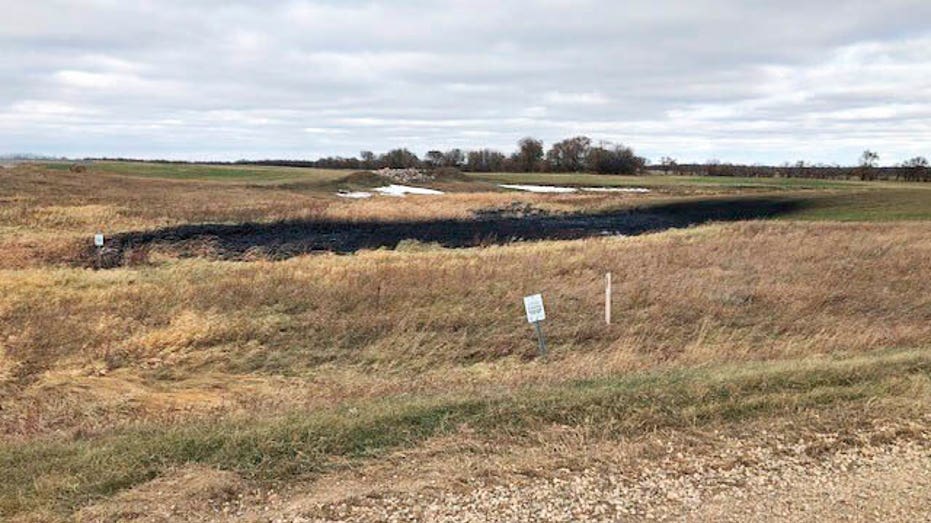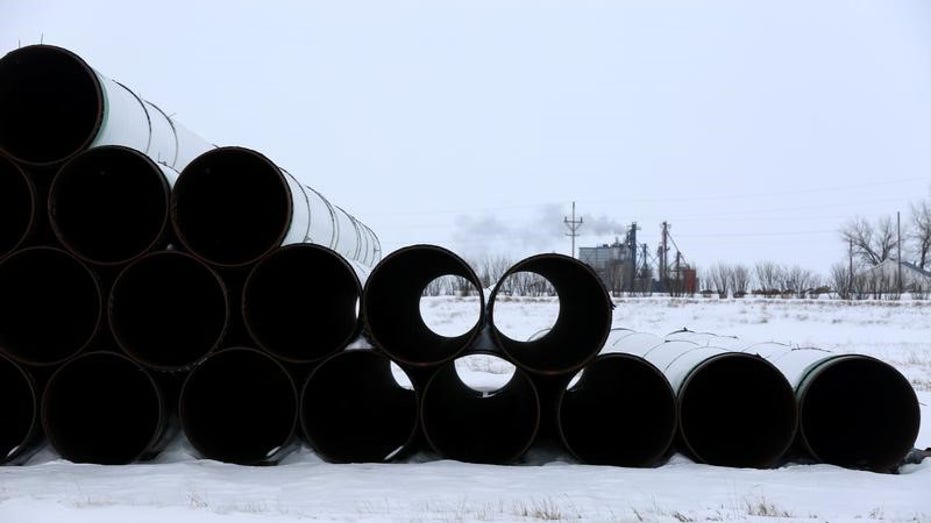Keystone XL: What's next for the pipeline in South Dakota
The pipeline's South Dakota opponents say they have't given up
PIERRE, S.D. — Plans for construction of the Keystone XL oil sands pipeline inched forward last week with several approvals at both the federal and state levels, but opponents in South Dakota say they haven't given up on preventing or, at least, slowing the pipeline's construction.
Plans for the $8 billion project have been more than a decade in the works. TC Energy, the Canadian company building the pipeline, plans to begin construction in South Dakota in August, according to a court filing in Montana that also spells out planned work in that state and Nebraska. The company plans to move equipment to construction sites starting in February and prep worker accommodation sites in March.
AMAZON EMPLOYEES CRITICIZE COMPANY OVER CLIMATE CHANGE, SAY THEY'RE RISKING TERMINATION
After the South Dakota Water Management Board approved five water permits for the pipeline's construction last week, Sara Rabern, a spokeswoman for TC Energy, said the company does not need any more permits from South Dakota agencies, but it is working to "finalize" permits from other authorities.
The pipeline would stretch 1,200-miles from western Canada to Nebraska, where it would connect with other lines that go to Gulf Coast refineries. It would be capable of pumping 830,000 barrels, or 35 million gallons, of crude oil a day.

Affected land from a Keystone oil pipeline leak near Edinburg, North Dakota. (North Dakota Department of Environmental Quality/Taylor DeVries)
TC Energy says the project would provide a $3.4 billion boost to the U.S. economy and reduce greenhouse gas emissions from trains that transport oil. Opponents say that burning the tar sands oil will make climate change worse and worry that an oil spill could cause major environmental damage.
Legal battles still loom.
Water crossing permits
The Army Corps of Engineers must approve TC Energy's plans to drill beneath three major rivers along the route, which include the Cheyenne River in South Dakota and the Missouri and Yellowstone rivers in Montana.
The approval for TC Energy to cross the Cheyenne River was suspended in August after TC Energy withdrew their notice for the project. But Michael Izard-Carroll, spokesman for the Army Corps of Engineers, said he expects TC Energy to file their notices this winter. The Corps in 2017 had given TC Energy the go-ahead for drilling under the Cheyenne River.

A depot used to store pipes for Transcanada Corp's planned Keystone XL oil pipeline is seen in Gascoyne, North Dakota, January 25, 2017. REUTERS/Terray Sylvester
The Sierra Club, along with several conservation and landowner groups, is suing the Army Corps of Engineers in federal court in Montana. They argue that the Corps should be more stringent in their requirements for water crossing permits.
South Dakota water permits
The South Dakota Water Board's decision to approve the water permits for construction last week can be challenged in court. Several opponents who contested the permits have said they're weighing whether to continue.
Dakota Rural Action, a South Dakota conservation group, is also appealing a water permit granted to the town of Buffalo in the northwest of the state. The group alleges the town's water superintendent didn't disclose that a permit for a new well would be used for Keystone XL construction.
The permit hearings for the five wells the Water Board did approve were contentious and spanned nearly a dozen days over several months.
South Dakota Legislature
The South Dakota Legislature will debate several bills that may affect Keystone XL.
The governor last year pushed and passed legislation that targeted potentially disruptive protests of the pipeline. But the American Civil Liberties Union successfully sued to block the so-called "riot-boosting" laws, and the state agreed in a settlement not to enforce parts of them.
Gov. Kristi Noem is planning to revisit the issue this year, with bills that she said would not infringe on free speech yet would provide for the punishment of people who urge the use of force or violence in protests.
Several Indian tribes in South Dakota, including the Rosebud Sioux, Crow Creek Sioux, Yankton Sioux, Cheyenne River Sioux, and Oglala Sioux, have written to the governor's office opposing the legislation.
"We do not anticipate anything other than peaceful and prayerful protests and gatherings," said Rosebud Sioux Tribe President Rodney Bordeaux in a letter to the governor.
GET FOX BUSINESS ON THE GO BY CLICKING HERE
Legislators are also proposing a bill that would force pipeline companies to pay into an emergency fund for spill cleanup. The bill has the backing of several legislators who are also tribal members.
Mni Wiconi easement
The Oglala Sioux Tribe is planning to argue to the Department of Interior that the pipeline needs to have permission, known as an easement, to pass a water pipeline called the Mni Wiconi Rural Water Supply Project in the western half of South Dakota. The water project is currently held in trust by the Bureau of Reclamation, meaning it grants the easements.
The Oglala Sioux Tribe Council has instructed the tribal president not to give permission for the pipeline to pass the water project.
CLICK HERE TO READ MORE ON FOX BUSINESS
The South Dakota Public Utility Commission ruled in 2015 that the tribe's permission wasn't necessary for the easement, and any legal argument otherwise should be decided in federal court.




















